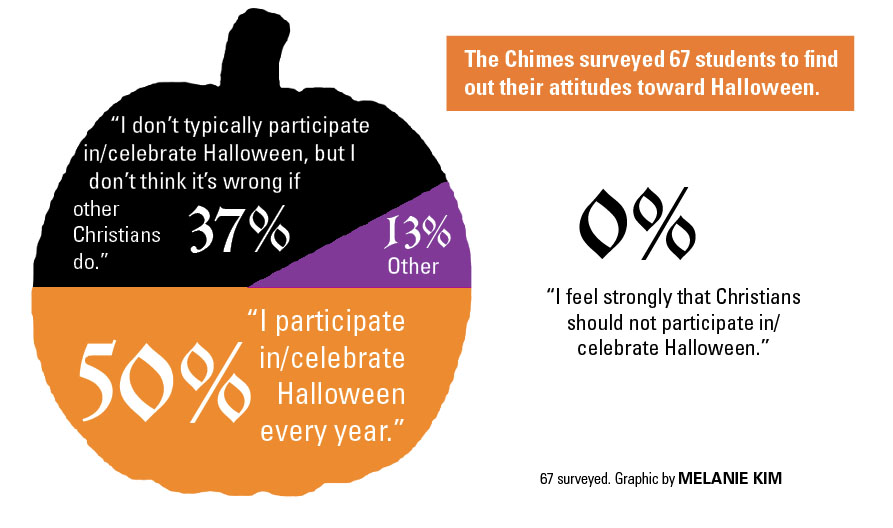
Fifty percent of Biola students surveyed participate in Halloween every year, according to a study conducted by the Chimes. The survey asked 67 students whether or not Christians should participate in Halloween activities.
Half of the students surveyed said that they celebrate Halloween. Thirty-seven percent said they do not typically participate but do not think it is wrong if other people do. Thirteen percent of students selected “other,” and several explained that they participated in harvest parties or alternate activities every year instead. No students answered that they felt strongly against Christians participating in Halloween activities.
Modern day uneasiness within the Christian community regarding Halloween can be attributed to a variety of factors, according to professor of intercultural studies Douglas Hayward.
“Halloween did not become a really big thing until the 19th century in America,” Hayward said.
At that time, rationalism was triumphing and Halloween turned into an occasion to make fun of the things that used to scare people, he explained.
The birth of neo-paganism and a revival of spiritism occurred in the 20th century, with participants embracing their traditional pagan religious roots, Hayward explained. They tried to reclaim Halloween as their own, and this further distanced many Christians from participating in the traditions surrounding the holiday.
DIVIDED VIEWPOINTS
“Sometimes we Christians have unwarranted responses to challenges to our faith,” Hayward said.
Cultural Halloween activities such as pulling pranks, trick-or-treating and rowdy parties have run into critics in both secular and religious circles. Damaging pranks are now prosecuted by the police and frowned upon by the law-abiding section of American culture, Hayward said. Though few casualties have happened on account of laced candy being handed out to trick-or-treating children, families are now drawn to safer alternatives offered within their churches and communities.
Hayward addressed the common misperception of Halloween as a Satanic holiday, claiming that it most certainly is not.
“Christians have been very careless in condemning [Halloween] and saying it’s Satanic. It’s pagan, it’s not Christian, but it’s not Satanic,” Hayward said.
Many Christians today have adopted traditions that offer a more church-friendly take on Halloween.
“[Halloween] offers marvelous opportunities to retain what is good without falling into all that is bad about it. I loved Halloween as a kid: I think it serves a good healthy function,” Hayward said.







